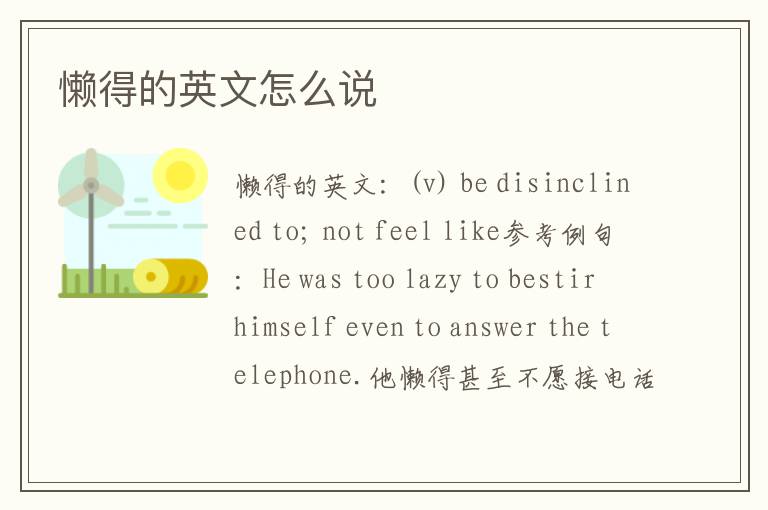
懒得的英文:
(v) be disinclined to; not feel like
He was too lazy to bestir himself even to answer the telephone.
他懒得甚至不愿接电话.
But Beijing people are too lazy to take these jobs.
可北京人却懒得去赚。
I am tired of listening to your preach.
我懒得听你对我讲的大道理。
The boy is too lazy to bath himself.
那男孩懒得从不自己洗澡。
Paul is so lazy that he will not work.
保罗懒得连工作都不想做
He comes to school by bus because he is too lazy to walk.
他乘公共汽车上学,因为他懒得走路。
"But if we rest on our laurels, we risk losing our vitality."
但是如果我们继续安于安逸,脑筋就会懒得变通。
The soldiers did not bother to moderate their coarse humour in her presence.
她在的时候,士兵们还是照样说粗俗的笑话,都懒得收敛。
She sprawled on the bed as he had left her, not even moving to cover herself up.
他离开她后她就摊手摊脚地躺在床上,甚至都懒得往身上盖点儿东西。
adj.不愿意的
His timidity disinclined him from such an arduous enterprise
他的怯懦使他不愿从事一项如此艰巨的事业。
His timidity disinclined him from such an arduous enterprise.
他的怯懦使他不愿从事一项如此艰巨的事业。
Her delicate constitution disincline her from such an arduous job.
她纤弱的体质使得她不欲担任如此艰钜的工作。
Her delicate constitution disinclined her from such an arduous job.
她纤弱的体质使得她不欲担任如此艰巨的工作。
Much benevolence of the passive order may be traced to a disinclination to inflict pain upon oneself(George Meredith.
人的许多被动的善行是源于不愿给自己造成痛苦(乔治·梅雷迪斯)。
v. 感觉;认为;有知觉;摸索
n. 感觉,印象
feeling of efficacy
效力感
Has a feeling for language.
对语言有领悟力
You can feel the electricity in the crowd.
你可感到群众的激情。
experience or feel; submit to.
经历或者感觉;使服从。
Savour the feeling of change.
尽情享受改变的滋味。